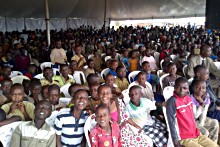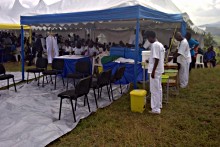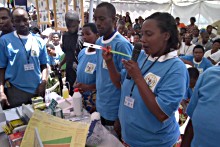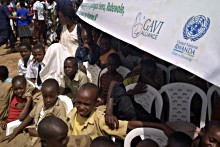
Charlie Whetham
GAVI Country Responsible Officer
2013

Community interest in the campaign: one of four marquees this size.
Rwanda’s 2012 Olympics wasn’t noteworthy, with the highlight an odds-defying 14th by Robert Kajuga in the men’s 10,000m.
It’s a very different story in immunisation. Rwanda leads the way amongst the poorest countries in Africa, with the first introduction of pneumococcal vaccine (for pneumonia and similar infections) in 2009; the first national introduction of human papillomavirus (HPV) vaccine in 2011; over 95% coverage for the vaccines they have introduced and now the first introduction of measles-rubella (MR) vaccine.
Vaccine introduction is no competition, but this list well illustrates the ambition of the leadership in Rwanda. And it is producing results, with under five mortality reduced from 250/1000 in 1995, immediately post-genocide to 177 in 2000 and to 91 in 2010.

Campaign preparations, with typical Rwandan thoroughness.
Last week I was in Rwanda for that first MR campaign. Rwanda has been carrying out measles campaigns every three years, supplementing their routine immunisation, which has reduced confirmed measles cases from 3500 in 2006 to fewer than 100 in subsequent years (Rwanda EPI reports). The measles surveillance system now identifies a higher proportion of rubella than measles cases.
Rubella vaccine is therefore a natural next step. Although rubella is usually a mild disease affecting children, when a pregnant woman becomes infected serious consequences can occur with Congenital Rubella Syndrome (CRS) causing hearing loss, blindness or heart defects in the baby, and still-birth also endangering the mother’s life. WHO (2011) estimate that 112,000 children a year (300 each day) are born with birth defects from CRS, placing heavy human and economic tolls on these children and their families.

Leveraging the wide reach of immunisation programmes to reach children with other life-saving interventions.
Now thanks to the technical advice of the Measles and Rubella Initiative and GAVI’s financial support, over 700 million children under the age of 15 in 49 countries will be protected against measles and rubella by 2020.
Over four days last week, Rwandan health workers vaccinated close to five million children between the ages of nine months and 14 years with the MR vaccine. Rwanda used the opportunity of the campaign to also provide a third national cohort of 12 year-old girls with their first dose of HPV, donated by Merck – GAVI will support the national programme from 2014. The selection by the Government of the Minister of Gender and Family Promotion, Hon. Oda Gasinzigwa, to be guest of honour at the campaign launch highlighted that the primary victims of both CRS and cervical cancer are women.

GAVI in partnership with the Government of Rwanda and the UN family
This campaign well illustrated how the wide reach of immunisation programmes can be leveraged to reach children with other life-saving interventions – with Rwanda providing vitamin A droplets, educating children on malaria-avoidance and testing, and providing a wide range of contraception.
GAVI describes our support for MR as catalytic: we meet the costs of the campaign almost entirely. In Rwanda, these totalled nearly US$ 7 million, with half paying for the vaccines, syringes and safe-disposal boxes and the other half for the daunting operational logistics. The key condition for this support is that the country itself then introduces MR into its routine immunisation programme, including paying itself for the vaccine from that point on, with only a small (US$ 300,000) further grant from GAVI. Rwanda will do this in January 2014.
GAVI: trackside coach in Africa’s race to immunise its children against vaccine-preventable diseases.
Charlie manages GAVI’s partnerships with the countries of East and Southern Africa to increase their use of new and underused vaccines which significantly reduce childhood mortality. His interest in athletics – an 800m (half-mile) personal best of 1 min 52 – doubtless influenced this article…
Photo credit: © UNICEF Rwanda/2013/Rusanganwa
